Methodism is a prominent branch of Protestant Christianity that dates to the mid-18th century. Pentecostalism is a movement within Protestantism that originated in the early 20th century. What’s the difference between Methodism and Pentecostalism? Are any Methodists Pentecostals?
Methodism is a tradition within Protestant Christianity that is made up of different denominations, like the United Methodist Church. Pentecostalism is a movement with Protestantism whose convictions, especially about the Holy Spirit, characterize the beliefs and practices of entire denominations like the Assemblies of God.
Do Methodists speak in tongues like most Pentecostals do? Do they believe in healing and prophecy like Pentecostals? How does Methodism compare with Pentecostalism on the doctrine of the Trinity, the deity of Christ, the inspiration of Scripture, and the end times? Keep reading to learn more.
Also, see Methodism vs. Roman Catholicism: Key Differences for more.

Methodist vs. Pentecostal: Speaking in Tongues
Historians, sociologists, and theologians generally agree that Methodism is a historic denomination within the framework of Protestant Christianity.
In the 20th century, Methodist denominations split multiple times over various disagreements. Therefore, Methodism can correctly be called a “denomination.” Simultaneously, it comprises several “denominations.” (Also see Do Methodists Drink Alcohol?)
Pentecostalism isn’t a denomination in the same way Methodism or Baptist, Lutheran, or Presbyterian traditions are. Instead, Pentecostalism is a characteristic of various Protestant denominations.
No Methodist denomination of significant size has adopted the distinct beliefs and practices that characterize Pentecostalism. However, some Methodists believe and practice the unique convictions of Pentecostalism. (Also see Do Methodists Dance?)
In Christian theology, Pentecostal theology has three distinguishing beliefs:
- Baptism in the Holy Spirit occurs after conversion instead of simultaneously with conversion.
- Speaking in tongues is the sign of Spirit baptism.
- All spiritual gifts operate today, including speaking in tongues, healing, and prophecy.
| Pentecostal Beliefs | Methodism | Pentecostalism |
|---|---|---|
| Baptism of the Holy Spirit occurs sometime after conversion | a few | all |
| Speaking in tongues is the sign of Spirit baptism | a few | all |
| All spiritual gifts are in operation today, including tongues, healing, and prophecy | some | all |
Most non-Pentecostal Protestant denominations believe baptism in the Holy Spirit occurs at conversion and is not a second, subsequent act that occurs sometime later.
Historically, the Methodist tradition has taught that baptism in the Holy Spirit happens at conversion. (Also see Do Methodists Have Female Pastors?)
Most non-Pentecostal Protestant denominations believe that speaking in tongues isn’t the only sign of baptism in the Holy Spirit. Some Christians believe that speaking in tongues is an actual and permissible practice, yet do not believe it’s the only sign of baptism in the Holy Spirit.
Methodists, who are continuationists, believe that speaking in tongues is a gift available today, but that doesn’t mean they think it’s the only sign of Spirit baptism.
- Some Methodists are cessationists (from the word “cease”). They believe that the so-called miraculous gifts like speaking in tongues, healing, and prophecy are no longer operational but were only for the first-century church.
- Other Methodists are continuationists (from the word “continue”), meaning they believe that the so-called miraculous gifts are operational and available to all generations of the church.

Methodist and Pentecostal Origins, Denominations, and More
Methodism and Pentecostalism have many similarities because they are both under the umbrella of Protestant Christianity. Yet their respective origins, organizations, and beliefs reflect essential differences. (Also see Why Do Methodists Change Pastors?)
| Methodism | Pentecostalism | |
|---|---|---|
| Founder | John Wesley (1703-1791) | there is no single founder |
| Origin | 18th-century England | Azusa Street Revival in Los Angeles, California, 1906 |
| Early influencer(s) | The Apostles’ Creed, The Nicene Creed, various denominational belief statements such as The 16 Fundamental Truths of the Assemblies of God | Charles Fox Parham, William J. Seymour, Agnes Ozman |
| Significant writing outside the Bible | The Apostles’ Creed, The Nicene Creed; Wesley edited the 39 Articles of Religion, removing the Calvinist teachings in it; he also edited the Book of Common Prayer after the Revolutionary War; the United Methodist Hymnal | The Apostles’ Creed, The Nicene Creed; various denominational belief statements such as The 16 Fundamental Truths of the Assemblies of God |
| Organization | It depends on the denomination. Many churches in the UMC denomination have adopted liberal perspectives on social and theological issues in recent decades. Other smaller denominations maintain conservative positions, such as the Evangelical Methodist Church (EMC). | Pentecostalism isn’t a denomination. The largest Pentecostal denomination is the Assemblies of God, which practices congregational church government. |
| Divisions | There are many denominations in the Methodist tradition. The United Methodist Church (UMC) is the largest. The African Methodist Episcopal Church (AMEC) is the second largest. | There are many Pentecostal denominations. Assemblies of God is the largest. The Church of God is the second largest. |
| Theological and Social worldview | Pentecostal denominations and churches tend to be conservative theologically and concerning social issues. | Pentecostal denominations and churches tend to be conservative theologically and in relation to social issues. |

Beliefs and Doctrine: Methodism vs. Pentecostalism
Methodist and Pentecostal beliefs about God and Christ are similar. Their disagreements are about the Holy Spirit and issues related to the church. (Also see Methodist vs. Anglican: What’s the Difference?)
| BELIEFS | Methodism | Pentecostalism |
|---|---|---|
| Theology (general) | Methodists are Protestant. They believe salvation is by grace through faith in Christ, and not according to works. | Pentecostals are Protestant. They believe salvation is by grace through faith, not according to works. |
| Theology (specific) | Methodists are Arminian. Within the framework of Arminianism, their doctrine is sometimes called “Wesleyan theology” or “Wesleyan-Arminian theology.” | Pentecostals are Arminian. Their theological system is conventionally referred to as “Pentecostal theology.” |
| God | Methodists believe in the Trinity. There is one God who exists in three persons. | Pentecostals believe in the Trinity. There is one God who exists in three persons. |
| Is Jesus God? | Yes | Yes |
| Is the Holy Spirit God? | Yes | Yes |
| The Bible | Moderate-liberal denominations view Christ as a martyr and his death as a form of activism for marginalized people. Conservatives believe Christ died in place of sinners and as a punishment for their sins. | The Bible is inspired. Most Pentecostals believe the Bible is inerrant. Pentecostals tend to have a high view of Scripture. |
| BELIEFS | Methodism | Pentecostalism |
|---|---|---|
| View of the atonement | Moderate-liberal denominations view Christ as a martyr and his death as a form of activism for marginalized people. Conservatives believe Christ died in the place of sinners and as a punishment for their sins. | Pentecostals generally believe that Christ’s death was an atonement for sin. |
| Salvation | Methodists are Arminian, as opposed to Calvinists or Reformed. | Pentecostal denominations, like the Assemblies of God, are Arminian. |
| Spiritual gifts | Some Methodists are cessationists; others are continuationists. Pentecostal expressions have been associated with revivalism in the Methodist tradition, which have historically been a topic of internal debate and tension. | Pentecostals are continuationists, as it’s a distinguishing feature of the movement. |
| Baptism | Pastors baptize infants as a sign of regeneration. Adult converts can be baptized, often by sprinkling. | Some Methodists are cessationists; others are continuationists. Pentecostal expressions have been associated with revivalism in the Methodist tradition, which has historically been a topic of internal debate and tension. |
| Communion | Methodists believe in the real presence of Christ, making it more than a mere memorial like in some Protestant traditions, but they don’t believe in transubstantiation as Catholicism teaches. | Most Pentecostal churches teach that the bread and cup are memorials of the death of Christ. They reject transubstantiation. |
| Eschatology | The Second Coming of Christ is a primary doctrine; the millennium is understood according to Amillennial theology. It interprets the 1,000 years described in Revelation 20:1-6 figuratively and defines it as the time between Christ’s first and second coming (i.e., the Church Age) | Pentecostals are strong dispensational, pretribulation, and Premillennialists. |
Please see the related articles below.
References:
[1] Source
[2] Source
[3] Source
Related Articles
Catholic vs. Protestant vs. Orthodox: What's the Difference?
Roman Catholicism, Protestant Christianity, and the Eastern Orthodox Church are the three historical branches of the Christian religion. Each tradition traces its doctrines and practices to the New...
Pentecostalism vs. Charismatic Movement: What's the Difference?
Many people know that the terms "Pentecostal" and "charismatic" are associated with certain beliefs, churches, and people in modern Christianity but aren't sure how they compare. Although the terms...
